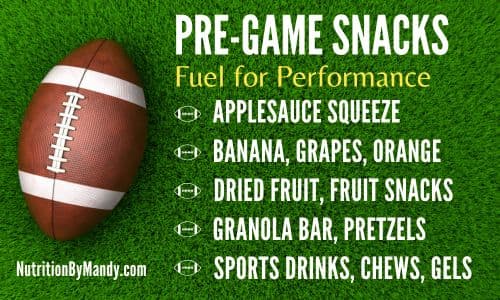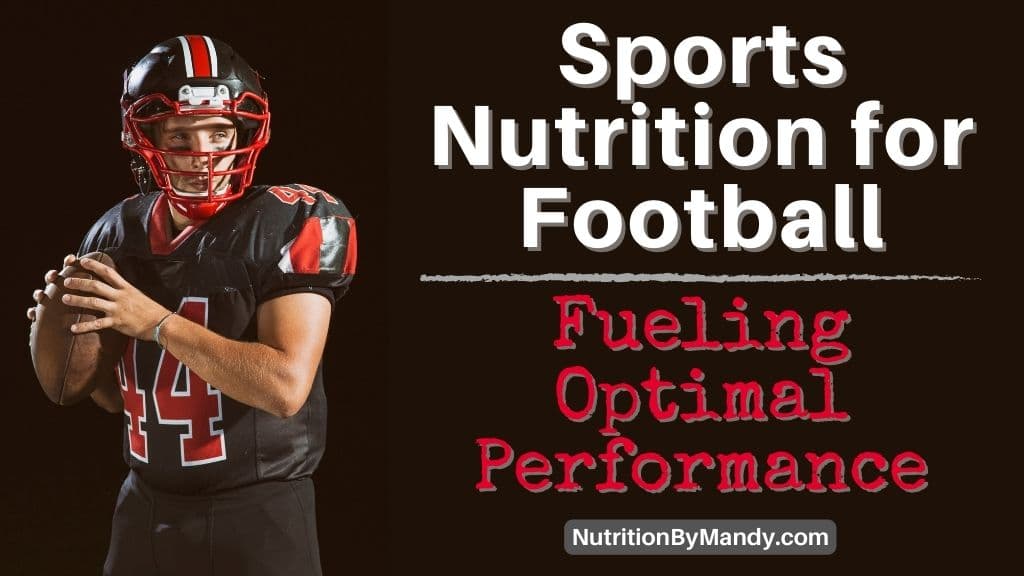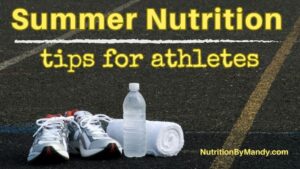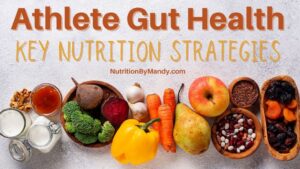Last Updated on April 25, 2025 by Mandy Tyler, M.Ed., RD, CSSD, LD
Sports Nutrition for Football: Fueling for Optimal Performance
It can be helpful for football players to have a sports nutrition meal plan in place to support optimal performance.
Let’s take a look at key nutrients to include in a meal plan for football players. Then we will explore sports nutrition strategies to support football players with performing at their best.
Meal Plan for a Football Player
When working with a football player to develop a meal plan, one key strategy I focus on is the importance of eating meals and snacks frequently throughout the day.
The calorie needs of football players will vary based upon the player’s position, height, weight, body composition, and level of training. However, it is common to find football players needing >5,000 calories per day to meet their sports nutrition needs (1).
Eat Frequently Throughout the Day
To meet these high calorie demands, eating consistently throughout the course of the day is necessary. I encourage football players to focus on fueling with 3 meals and 3 snacks each day.
This means athletes need to plan to start the day with a healthy breakfast, even if it is a quick breakfast on-the-go.
Football players should also make time to eat a well-balanced lunch and enjoy a nutritious dinner that support their sports nutrition needs.

Pack Snacks for the Day
In addition, football players should pack healthy snacks to take with them to fuel throughout the day.
When possible, football players should take time on the weekend to meal prep snacks to have available throughout the week.
Simple ingredient prep tasks include:
- Pack trail mix, pretzels, or nuts into individual snack size bags
- Prepare turkey and cheese sandwiches or wraps and individually package to-go
- Hard-boil eggs for a protein-rich snack addition
- Chop fresh fruits and vegetables
- Pack a snack bag to grab on your way out the door, including items such as: string cheese, fruit, jerky, nuts, nut butter
Nutrition for Football: Carbohydrates for Energy
Carbohydrates should be at the foundation of a football player’s meal plan. Similar to gas in a car, carbohydrates provide football players with the energy needed to train and perform at their best.
Too often, however, I find that football players are not consuming enough carbohydrates. Frequently this is due to football players eating a large amount of protein, leaving little room for carbohydrates in their diet.
It is important for football players to keep in mind that inadequate carbohydrate intake can negatively impact their training and performance (1).
Football players can add carbohydrates to their diets from a variety of sources, including:
- Fruit: Fresh, frozen, dried, canned in natural juices, 100% fruit juice, applesauce
- Grains: Bread, bagels, English muffins, wraps, breakfast cereal, oatmeal, rice, pasta
- Starchy vegetables: Potatoes, sweet potatoes, beans, legumes, peas, corn
- Dairy: Milk, yogurt

Protein for Football Players
Consuming adequate protein in the diet is also important for football players. Protein is necessary to support athletes with building and maintaining lean muscle mass.
The protein needs of football players will vary depending on the specific goals of the athlete and whether or not the athlete is injured.
However, in general, consuming 1.6-1.7 g of protein per kg of body weight per day is adequate for most football players (1).
For a 240-pound athlete, this would calculate to be in the range of 175-185 grams of protein per day.
Spread Protein Throughout the Day
In addition to the total amount of protein consumed, football players should also consider when it is eaten during the day.
To get the most benefit from protein, football players should aim to spread their protein intake throughout the day with their meals and snacks (2).
Athletes are encouraged to consume ~0.25-0.3 grams of protein per kg of body weight with meals and snacks spaced evenly throughout the day (2, 3). In addition, football players should include protein in their post-workout meals/snacks to support their recovery nutrition needs.
For the 240-pound football player, this would calculate to be at ~27-33 grams of protein at each eating occasion.
If the football player is eating 3 meals and 3 snacks daily (eating 6 times throughout the day), he would easily meet his protein needs.
Reminder: Eating protein alone will not result in a football player gaining muscle mass. For football players to build muscle, a well-planned sports nutrition diet must be combined with a proper strength and conditioning program.

High-Protein Evening Snack for Football Players
Football players who desire to gain weight should also prioritize eating a high-protein evening snack before bed.
During sleep the body recovers from the activities of the day. Consuming protein before going to bed can help promote muscle protein synthesis during the overnight recovery period (2, 4).
Thus, I often tell athletes that a high-protein evening snack before bed is their secret weapon for weight gain.
Eating a protein-rich evening snack can also be a good strategy to support football players with maintaining lean mass over the course of an intense season.
Evening Snack Ideas for Football Players
Easy ideas for adding protein to an evening snack include:
- High-protein milk
- Greek yogurt
- Cottage cheese*
- Nuts and nut butter
- Kodiak® Cakes – protein pancakes or waffles (delicious topped with nut butter)
- High-calorie smoothie
*Note: If football players don’t like the texture of cottage cheese, it blends great into a smoothie for added protein.
Hydration for a Football Player
Hydration is an essential component of a football player’s meal plan. Dehydration can negatively impact performance and be harmful to an athlete’s health.
Football players are at an increased risk for dehydration related to several factors, including (5, 6):
- Football padding, helmet, and uniforms preventing heat dissipation
- Games played in hot and humid environments
- Larger overall body size of players with greater sweat losses
It is important to note that football players are highly variable in regard to both the amount of fluid and the amount of electrolytes lost in sweat.
Thus, when possible, it is best for a football player to work with a sports dietitian nutritionist to develop an individualized hydration plan to support their performance needs.

Rehydrate Following Activity
Following activity, football players should be particularly mindful to replace the fluid and electrolytes lost in sweat. This is important to ensure that football players do not start the next exercise session in a dehydrated state.
Weighing before and after activity can help football players determine how much fluid was lost in sweat. For each pound of weight lost during the activity, athletes should aim to drink 20-24 oz of fluid (3).
Consuming sodium following activity can help football players with replacing the sodium lost in sweat. In addition, sodium helps athletes to better retain the fluid consumed after exercise (7).
Football players can consider adding salty foods to their recovery nutrition meals and snacks, such as:
- Deli meat, cheese, cottage cheese
- Pretzels, pita chips, snack crackers
- Pickles, relish, capers, olives
- Broth-based soup, tomato sauce
- Beef or turkey jerky
- Vegetable juice
- Sports drinks
Note: If a football player has been advised to restrict their sodium intake, he should meet with a sports dietitian nutritionist regarding an individualized plan for meeting his fluid and electrolyte needs.
Daily Hydration Tips for Football Players
Outside of activity, I encourage football players to ensure they are taking steps to stay hydrated throughout the day, such as:
- Drinking fluid with each meal and snack
- Carrying a refillable water bottle as a reminder to hydrate
- Adding fruits and vegetables with a high-water content, such as watermelon, oranges, celery, and cucumbers to meals and snacks
Include Anti-Inflammatory Foods in a Football Player’s Meal Plan
Finally, football players should ensure their meal plan includes a variety of foods that can help reduce inflammation in the body and enhance recovery.
Anti-inflammatory foods I suggest football players aim to add to their meals and snacks include:
- Berries and cherries
- Dark green leafy vegetables
- Avocados, tomatoes, broccoli, bell peppers, mushrooms
- Fatty fish: Salmon, tuna, mackerel, sardines, and herring
- Nuts: Walnuts, almonds, pistachios
- Seeds: Chia seeds, flaxseeds
- Herbs and spices: Turmeric, ginger, garlic, black pepper, cinnamon, rosemary
Sports Nutrition Strategies for Football
Now that you have an idea of key nutrients to include in a football player’s meal plan, let’s explore sports nutrition strategies for football practices and games.
Nutrition for Football: Fuel Your Workouts
Going into practices and games well fueled should be a top priority for football players.
Football players often spend a lot of time focusing on what to eat before a game. However, they spend little time considering what they eat before practice.
It is important for football players to remember that fueling for practice is just as important as fueling for a game.
If football players want to reap the benefits of their workouts, it is important they are fueled to train at their best.

What to Eat Before Morning Football Practice
It is common for high school and college football players to have early morning practices before class. Too often, I find that football players will skip eating in the morning in the rush to get to practice on time.
However, if football players want to train at their best, they should put gas in their tank before working out.
When football players have limited time to eat before morning practice, they should focus on consuming a pre-workout snack that is high in carbohydrates.
Easy carbohydrate-rich snacks athletes can enjoy prior to a morning practice include:
- Banana, small piece of fresh fruit
- Applesauce squeeze, dried fruit
- Bagel, English muffin, toast with jelly
- Breakfast bar, fig bar, low-fat granola bar
- Instant oatmeal, cream of wheat
- Dry breakfast cereal, graham crackers, animal crackers
- Microwave pancakes, toaster waffle, low-fat muffin
- Fruit smoothie
With their pre-workout snack, it is important for football players to hydrate as well. I encourage athletes to drink at least 8 oz (1 cup) of water or a sports drink as they head to the football field.
What to Eat After Morning Football Practice
If football players will be heading straight to class following their morning workout, it important they take time to eat a well-planned snack that can support their recovery nutrition needs.
There are three key concepts football players should keep in mind to support recovery:
- Rehydrate: Replace fluid and electrolytes lost in sweat during the activity
- Refuel: Consume carbohydrates to refill energy stores used during the activity
- Build and Repair: Consume protein to help build and repair lean muscle mass

Recovery Nutrition Snacks Ideas for Football Players
Quick and easy snacks football players can enjoy after a morning workout include:
- Low-fat chocolate milk and a peanut butter and jelly sandwich
- Greek yogurt, berries, and granola
- Bagel with nut butter and low-fat milk
- Breakfast bars, hard-boiled eggs, 100% fruit juice
- Cottage cheese with fruit, English muffin
- Fig bars, cheese sticks, low-fat milk
- Protein overnight oats with 100% fruit juice
- Sports protein bar with sports drink
What to Eat Before Afternoon Football Practice
When football players have practice in the afternoon, thy should aim to eat a healthy lunch that will provide them with the energy needed for the upcoming practice.
In addition, in the 1-2 hours prior to the start of practice, they should aim to eat a high-carbohydrate snack that will provide them with additional energy for the afternoon practice.
This is especially important for football players participating in afterschool sports who ate lunch early in the day.
In addition to the high-carb snacks shared above, salty carbohydrate-rich snacks, such as pretzels or pita chips, can be a good choice before afternoon football practice.
The sodium in the snack will stimulate thirst and also helps the body better retain the fluid drank prior to practice (3).
Post-Practice Snacks for Football Players
Similar to morning practices, if it will be several hours prior to the next meal, football players should eat a snack following their afternoon workout.
In addition to the ideas shared above, healthy snacks that football players can enjoy after an afternoon workout include:
- Peanut butter and jelly sandwich with low-fat milk
- Low-fat chocolate milk, granola bars, banana
- Turkey and cheese wrap with tart cherry juice
- String cheese, jerky, pretzels with sports drink
- Trail mix made with nuts, seeds, dried fruit, and pretzels with low-fat milk
- Post-workout smoothie
Post-Workout Meal for Football Players
When football players get home for the day, they can further support their recovery nutrition needs by eating a well-balanced meal.
My blog on dinners for athletes as well as healthy fast-food options for athletes provide ideas for meals on busy weeknights that can support a football player’s nutrition needs.
Nutrition for Football: Game Day Plan
In addition to having a plan for how to fuel for practice, it is important for football players to have a game day nutrition plan.
Pre-Game Meal for Football Players
When possible, I encourage football players to plan to eat their pre-game meal 3-4 hours prior to the start of the football game.
For example, if the football game kicks-off at 7:00 pm, football players should aim to eat their pre-game meal between 3:00 – 4:00 pm.
The pre-game meal should be centered around high-carb foods that will provide athletes with the energy needed to perform at their best in the upcoming game.
In addition to carbohydrates, the meal should contain a moderate amount of lean protein, and be relatively low in fat and fiber.
Football Pre-Game Meal Ideas
Pre-game meal ideas that football players may enjoy include:
- Pasta with marinara, sliced chicken or turkey meatballs, vegetables, breadsticks
- Turkey sub sandwich, pretzels, fresh sliced fruit cup
- Grilled chicken wrap, baked chips, banana
- Salmon filet, steamed rice, green beans, dinner rolls
- Roasted chicken breast, roasted potato wedges, corn, fresh fruit salad, dinner rolls
- Fruit smoothie, bagel with nut butter and jelly
Along with the pre-game meal, athletes should also focus on hydration. Football players should aim to drink ~2-3 cups of fluid (5-7 mL/kg of body weight) with their pre-game meal (7).

Pre-Game Snacks for Football Players
In the hour or two leading up the start of the football game, athletes can continue fueling with an easy-to-digest, high-carb snack.
The snack will provide the football player with a quick source of energy as they head into the game.
Football Pre-Game Snack Ideas
Easy, pre-game snacks that football players can enjoy include:
- Applesauce squeeze, dried fruit
- Banana, small piece of fresh fruit
- Low-fat granola bar, carbohydrate-based sports bar
- Pretzels, snack crackers
- Fruit snacks, fruit leather
- Sports drinks, gels, or chews
Keep in mind that each football player is unique in terms of what foods and drinks they feel best competing on.
I find that some athletes only prefer liquids in the hour leading up to the game, while others prefer a few bites of a bar or some sports chews.
Thus, it is always best for football players to practice their pre-game meal and snacks prior to game day.

Football Nutrition: Fueling During the Game
During a football game, an athlete’s focus should be on rehydrating and refueling with carbohydrates.
Consuming carbohydrates during a football game can help provide athletes with a continued source of energy on the field.
Athletes engaged in intermittent sports that involve frequent bouts of high-intensity exercise, such as football, should aim to consume 30-60 grams of carbohydrates per hour (3, 8).
Consuming a sports drink during a game can help athletes with replacing fluids and electrolytes, as well as providing a source of carbohydrates for energy (5).
Halftime Snacks for Football Players
Football players should also use the halftime break as an opportunity to rehydrate and refuel.
Halftime snacks such as a banana, an applesauce squeeze pouch, fruit chews, pretzels, sports drinks, chews, or gels can all provide athletes with an extra source of energy for the second-half of the game.
Post-Game Meal for Football Players
Following a game, I encourage football players to focus on rehydrating and eating a nutritious post-game meal that provides both carbohydrates and protein.
Typically, football teams only play one game per week, thus athletes have a longer time to recover between games than many sports (1).
However, providing football players with a healthy team dinner following a game is beneficial in supporting their overall sports nutrition needs.
Nutrition for Football: Off-Season Changes in Body Composition
When possible, the best time for football players to focus on making changes in their body composition is during the off-season.
During the off-season athletes have time to focus on sustainable changes to their diets. Over time these changes can result in desired increases in lean mass and/or decreases in body fat.
It concerns me when a football player comes into training camp with the need to make large changes in his body composition.
Too often, attempts to gain weight or lose weight quickly can lead to football players following unhealthy dietary practices, such as dirty bulking or severe caloric restriction.
In addition, quick weight loss may result in the loss of lean muscle mass, which is not the desired outcome for football players.

Use Caution with Sports Supplements
I also urge football players to use caution with sports supplements promoting quick weight gain. Supplements can potentially contain banned substances that are harmful to your health or that make you ineligible for competition (9).
Football players should have a sports dietitian nutritionist review any dietary supplements they are considering taking.
The sports dietitian nutritionist can provide guidance on the safety and efficacy of the supplements. In addition, the sports dietitian nutritionist can work with the football player on developing a meal plan to support their body composition and performance goals
Sports Nutrition for Football: Fueling for Optimal Performance
You are now set with sports nutrition strategies for football players to support optimal performance.
For additional sports nutrition tips for football players, check out my blog on the best foods for concussions.
Join the Nutrition By Mandy Email List & Get a Free Athlete’s Grocery List
Click HERE to join the Nutrition By Mandy e-mail list. When you join you will receive a free athlete’s grocery list to print and take with you to the store.
About the Author
Mandy Tyler is a Sports Dietitian Nutritionist in the San Antonio, TX area. She is a Registered and Licensed Dietitian, a Board-Certified Specialist in Sports Dietetics, a Licensed Athletic Trainer, and is a Certified Exercise Physiologist through the American College of Sports Medicine. Mandy has experience working with athletes at the high school, collegiate, and professional levels. She believes the key to reaching one’s full potential, both in everyday life and in sports performance, relies on a healthy nutritional foundation.

If you are looking to take your performance to the next level, make sure to check out my new Sports Nutrition Game Day Guide. This downloadable guide is written to help athletes develop an individualized plan to achieve peak performance on game day.






